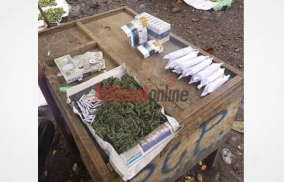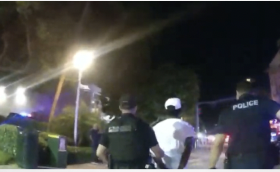The report reveals there isn’t much money in the coffers at the moment.
The Medical Cannabis Regulation Commission on Friday voted unanimously to petition Guam lawmakers to revise their spending plan to include funding for implementation of the long-stalled medicinal marijuana program.
In its 2020 budget request, the Department of Public Health and Social Services asked for $750,000 from the Healthy Futures Fund to fund the program.
Gov. Lou Leon Guerrero included that amount in her 2020 spending plan, Bill 75-35, which was submitted on April 9.
However, the appropriation was left out of the Legislature’s budget proposal, Bill 186-35, which was introduced on July 29. It left DPHSS with no funds to get the program off the ground.
“This is the people’s mandate,” Andrea Pellacani said at Friday’s meeting, referring to the referendum approving the use of marijuana for medicinal purposes. She is the managing partner of Grassroots Guam and a nonvoting member of the commission.
Pellacani told fellow commissioners that she made that point to legislative finance committee chairman Sen. Joe San Agustin. He responded in an email writing “There is no mandate to fund medical cannabis programs with the Healthy Futures Fund.”
The senator advised Pellacani that licensing fees were intended to fund the implementation of the medicinal cannabis program.
San Agustin went on to say, “Unfortunately, there is only so much money to go around and we wanted to ensure GMH and Public Health, Guam Behavioral Health & Wellness were funded as much as possible first.”
Public Law 32-134, known as the Joaquin “KC” Concepcion II Compassionate Cannabis Use Act of 2013, authorized a referendum to allow Guam voters to decide whether the use of marijuana for medical purposes should become legal. In November 2014, voters overwhelmingly approved.
Implementation has long been stalled because of the absence of rules and regulations, lack of a testing laboratory to ensure product safety and no money.
The Leon Guerrero administration has recently revived the effort to implement the law by appointing a full slate of commissioners and approving funding to finally get it off the ground.
Pellacani said, “Twenty thousand people voted for it, and I don’t know that the lack of money is going to fly anymore.”
Commission member Aline Yamashita suggested Pellacani draft a message to lawmakers urging inclusion of the funding requested in the 2020 budget, and the commission unanimously agreed.
DPHSS Director Linda DeNorcey, who is the commission chair, said, “I’m going to keep moving forward” with implementation.
DeNorcey said it will be hard without funds to purchase the software required by law to track medical marijuana from seed to sale and to pay for other regulatory requirements.



















